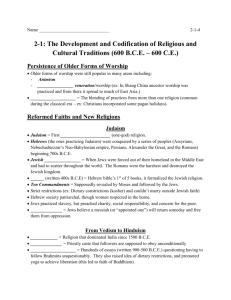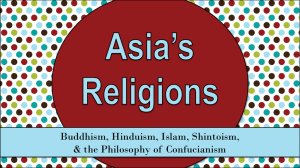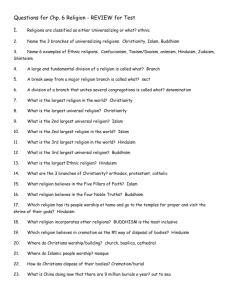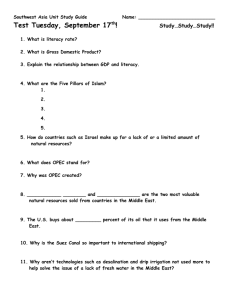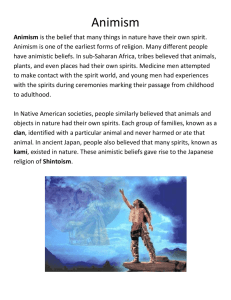Name
advertisement
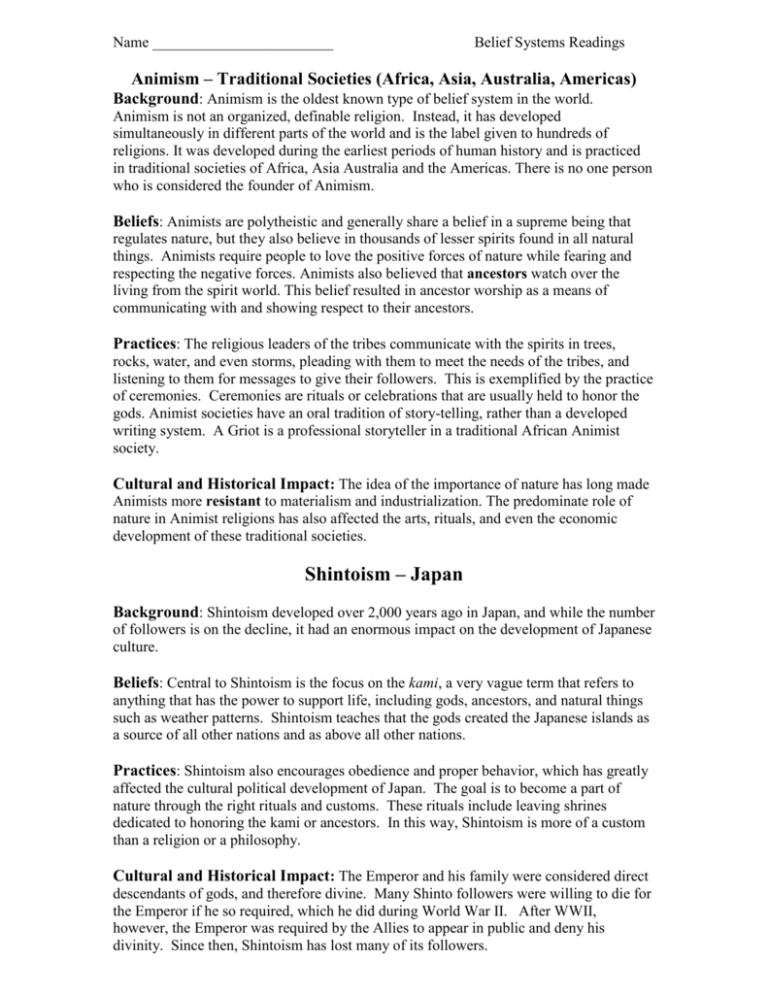
Name ________________________ Belief Systems Readings Animism – Traditional Societies (Africa, Asia, Australia, Americas) Background: Animism is the oldest known type of belief system in the world. Animism is not an organized, definable religion. Instead, it has developed simultaneously in different parts of the world and is the label given to hundreds of religions. It was developed during the earliest periods of human history and is practiced in traditional societies of Africa, Asia Australia and the Americas. There is no one person who is considered the founder of Animism. Beliefs: Animists are polytheistic and generally share a belief in a supreme being that regulates nature, but they also believe in thousands of lesser spirits found in all natural things. Animists require people to love the positive forces of nature while fearing and respecting the negative forces. Animists also believed that ancestors watch over the living from the spirit world. This belief resulted in ancestor worship as a means of communicating with and showing respect to their ancestors. Practices: The religious leaders of the tribes communicate with the spirits in trees, rocks, water, and even storms, pleading with them to meet the needs of the tribes, and listening to them for messages to give their followers. This is exemplified by the practice of ceremonies. Ceremonies are rituals or celebrations that are usually held to honor the gods. Animist societies have an oral tradition of story-telling, rather than a developed writing system. A Griot is a professional storyteller in a traditional African Animist society. Cultural and Historical Impact: The idea of the importance of nature has long made Animists more resistant to materialism and industrialization. The predominate role of nature in Animist religions has also affected the arts, rituals, and even the economic development of these traditional societies. Shintoism – Japan Background: Shintoism developed over 2,000 years ago in Japan, and while the number of followers is on the decline, it had an enormous impact on the development of Japanese culture. Beliefs: Central to Shintoism is the focus on the kami, a very vague term that refers to anything that has the power to support life, including gods, ancestors, and natural things such as weather patterns. Shintoism teaches that the gods created the Japanese islands as a source of all other nations and as above all other nations. Practices: Shintoism also encourages obedience and proper behavior, which has greatly affected the cultural political development of Japan. The goal is to become a part of nature through the right rituals and customs. These rituals include leaving shrines dedicated to honoring the kami or ancestors. In this way, Shintoism is more of a custom than a religion or a philosophy. Cultural and Historical Impact: The Emperor and his family were considered direct descendants of gods, and therefore divine. Many Shinto followers were willing to die for the Emperor if he so required, which he did during World War II. After WWII, however, the Emperor was required by the Allies to appear in public and deny his divinity. Since then, Shintoism has lost many of its followers. Hinduism – India Background: Hinduism is a religion that was founded in India. It has no one founder but rather has been formed through the traditions of the Aryans, a nomadic group from central Asia and the customs of the early Indus River and Ganges River Valleys. Hindu beliefs and practices have been passed down from generation to generation for the last 5,000 years through customs and traditions. Hindu religious texts include the Vedas and Upanishads which are a collection of Hindu writings that contain prayers and verses about creation and life as well as providing guidelines for proper ways of behavior. Beliefs and Practices: Hinduism is generally considered a polytheistic religion. Brahma is the Supreme Being in the Hindu religion. Hindus believe in millions of different gods that are considered manifestations of Brahma. Other important gods or deities are Vishnu, the preserver of life and Shiva, the destroyer and creator. It is believed that these gods control the cycle of life, death and rebirth. Hindus believe that life is a series of births, deaths and rebirths. It is believed that one’s caste or station in life, is the result of how one behaved in a previous life and one’s future station in life will be the result of how one behaved in the present life. These concepts are known as reincarnation and karma. Reincarnation is the belief that your soul is reborn into another body after death. Karma is a belief that a person’s deeds (actions, thoughts, and words) affect their future. How one lives their life is critical because it determines a person’s occupation and social status. It is the goal of all Hindus to break the cycle of rebirths entirely, reaching the state of Moksha, which is a state of peace free from suffering. In order to reach Moksha, Hindus believe they must live their lives according to the concept known as dharma, or duties of one’s caste. They must make offerings and pilgrimages, follow the rules of their caste, and pay proper respect to the Hindu Gods. It is believed that if one leads a good life, with good karma and follows their dharma, then they will be rewarded by being reincarnated as a person belonging to the next highest level in the Caste System. However, if one has “bad karma” during their life, they will be demoted, and possibly even removed from the Caste System altogether. Untouchables or outcasts, are members of Hindu society thought to have been removed from the Caste System, with no hope of returning to it, due to their misdeeds in previous lives. Hindus also believe that they must show regard for their ancestors and for all life (including animals), since all parts of nature, both past and present, are part of the cycle of rebirth. This respect for all living things is called ahimsa. Cultural and Historical Impacts: The belief in reincarnation has affected the social, political, and economic development of India enormously since 80% of their population is Hindu. The caste system was outlawed when India became an independent nation, but millions still practice it as part of their religion fearing that they will obtain bad karma. The people of the lowest caste (the untouchables) cannot socially mingle or even work side by side with the people of the highest caste. This has led not only to social discrimination, but widespread employment discrimination as well. The untouchables do all the dirty jobs that nobody else will do. Many Hindus do not challenge discrimination, because they want to be rewarded with a higher caste in a later life. Social mobility is therefore greatly hindered. Nevertheless, as more people have moved to the cities, they have begun to disassociate themselves form the caste system. In fact, recently, untouchables have risen to positions of political authority. Women have also faced hardships as they have been traditionally treated as the property of men. One practice that has exemplified this is the practice sati, the ritual burning of a man’s wife during his cremation. This practice has been outlawed but is still found in traditional India farming villages However, Hinduism remains a tremendous influence in the lives of millions of Indians today. Buddhism – East and Southeast Asia Background: Buddhism is a belief system that was founded in India by Siddhartha Gautama around 500 BCE. Siddhartha was a prince born into the Brahmin caste, and led a luxurious lifestyle. However, he was troubled by the human misery that he saw around him everyday (death, illness and poverty). After meditating under a Bodhi tree, he awoke as the Buddha or Enlightened One and concluded that desire was the root that caused suffering. Beliefs and Practices: Buddhism might be better described as a life philosophy than a religion, since the practitioners do not believe in an all-powerful god or gods that can grant them salvation. Buddhism focuses on achieving enlightenment or Nirvana by having the proper mindset and behavior. Siddhartha Gautama's philosophy, known as the Four Noble Truths states that human suffering is linked to human desire and can explained by these four statements: (1) Life is full of pain and suffering; (2) Human desire causes this suffering; (3) By putting an end to one’s desire, humans can end suffering and (4) Humans can end desire by following the Eight-fold Path. Buddhists generally believe that it is up to the individual to acquire wisdom and to break free of materialism (owning luxury items) in order to achieve Nirvana. Similar to Hindus, Buddhists also believe in an endless cycle of samsara or reincarnation and concept of karma. However, Buddhists do not believe that deities are responsible for the phenomenon. In addition, the Caste System is rejected by Buddhists. Buddhists believe that the way to break free of this materialism and endless cycle of life, death and rebirth is to follow the Noble Eight-Fold Path, or the “middle way” to achieve Nirvana. This path of behavior focuses on having the (1) Right Views, (2) Right Aspirations, (3) Right Speech, (4) Right Conduct, (5) Right Livelihood, (6) Right Effort, (7) Right Mindfulness and (8) Right Contemplation. Cultural and Historical Impacts: Although Buddhism was founded in India, it is predominately practiced in East Asia and Southeast Asia due to trade, migrations and missionary work. Buddhism has affected the cultural and social development of these regions. In general, the Buddhist philosophy of rejecting material wealth and possessions has contributed to the region’s relative isolation and general subsistence living for centuries. Even as the region industrializes, many people in the region do not desire many of the material gains that industrialization and modernization promises them. Confucianism - China Background: Confucianism is a life philosophy that was started by a philosopher Confucius in China around 500 BCE. Confucius lived in China during the Zhou Dynasty, when there was mass disorder and degrading moral standards. Confucius was appalled by what appeared to be the fracturing of Chinese society. He believed that the only cure was to stress a sense of social order and mutual respect, a philosophy that later became known as Confucianism. Beliefs: Confucianism is considered a philosophy more than a religion because it is concerned with daily conduct in the here and now and not with salvation or the afterlife. Confucianism focused on individual relationships and the duties that individuals owe to one another within their families and society. Confucianism teaches that there is a natural social order to society. It is believed that political and social stability can be achieved if everyone knew their role in their family and society through the Five Relationships. These relationships include: (1) ruler to subject, (2) father to son, (3) older brother to younger brother, (4) husband to wife and (5) friend to friend. In these relationships, the first role is considered superior to the second role and the second role is considered inferior or subordinate to the first. Practices: Confucian philosophy assumes a social structure where the inferior classes owe respect to superior classes and most importantly the ruling classes owe fairness and kindness to the inferior classes. The same is true in family relationships. The younger generations must be respectful and dutiful to the older generations, including generations that have already passed away. For example, the ruler must provide leadership, guidance and discipline to the subjects, while the subjects must show loyalty, love and compliance to the leader. This would be the same for fathers and sons, husbands and wives and older brothers to younger brothers. The only relationship that is equal to one another is friend to friend. It was taught that if everyone knew their place in society, then order would prevail. There are several concepts which needed to be practiced in order to achieve an orderly society, the most important being filial piety or showing respect to the superiors in society. Other important concepts are: Jen which means showing kindness towards others and Li, which means using proper etiquette to achieve perfect virtue. Cultural and Historical Impacts: Confucianism has affected Chinese culture enormously. Confucianism stressed the importance of education for the upper class or scholar gentry to have a well run system of government. The Han Dynasty created Civil Service Exams, exams based on Confucian principles that Chinese officials must pass in order to work for the government. This created a government positions for people based on ability, rather than social status. However, for centuries, Confucian principles also reinforced the class system and repressed new ideas from younger generations and have contributed to the subordinate or inferior position of women in society. Today, Confucianism is still practiced by more than 150 million followers in China and in Southeast Asia even though Communist China is officially atheist and officially classless. Daoism – China Background: The founder of Daoism is believed by many religious historians to be Lao-Tzu (604-531 BCE), whose life overlapped that of Confucius (551-479 BCE). He was searching for a way that would avoid the constant feudal warfare and other conflicts that disrupted society during his lifetime. The result was his book: Tao-Te-Ching. Beliefs and Practices: Central to Daoism is the concept of the Dao, or the way. It refers to a power which surrounds and flows through all things, living and non-living. It is a philosophy which teaches that nature has a “way” in which it moves, and that people should accept the “way” rather than resist it. The Dao regulates natural processes and nourishes balance in the Universe. The yin and yang is the harmony of opposites and is a well known Daoist symbol. It represents the balance of opposites in the universe (i.e. there would be no love without hate, no light without dark, and no male without female). When they are equally present, all is calm. When one is outweighed by the other, there is confusion and disarray. It is a force that flows through all life. The Dao surrounds everyone and therefore everyone must listen to find enlightenment. Each believer's goal is to harmonize themselves with the Dao. Taoism has provided an alternative to the Confucian tradition in China. The two traditions have coexisted in the country, region, and generally within the same individual. They seek answers to life's problems through inner meditation and outer observation. Daoists follow the art of "wu wei," which is to let nature take its course. For example, one should allow a river to flow towards the sea unimpeded; do not erect a dam which would interfere with its natural flow. Daoists viewed governments as “unnatural” and believed that the best governments are the ones that govern the least. Daoism teaches that lessened the need for rules and order, and leads one to a better understanding of the world. Cultural and Historical Impacts: Daoism, along with Buddhism and Confucianism, became one of the three great religions or philosophies of China. With the end of the Ch’ing Dynasty in 1911, state support for Daoism ended. Much of the Daoist heritage was destroyed during the next period of warlordism. After the Communist victory in 1949, religious freedom was severely restricted. The new government put monks to manual labor, confiscated temples, and plundered treasures. Several million monks were reduced to less than 50,000 by 1960. During the Cultural Revolution in China from 1966 to 1976, much of the remaining Daoist heritage was destroyed. Judaism Background: Judaism is an ancient religion that originated in Palestine (Israel) around 2000 BCE. Judaism is the oldest known monotheistic religion still practiced in the world today. Its fundamental teachings have been influential and are the basis for more recently developed religions such as Christianity and Islam. Beliefs and Practices: Jews are monotheistic, which means they believe and worship one god. They believe that they are God’s chosen people due to the covenant, or agreement made between God and Abraham. Jews believe that conduct should be consistent with the qualities of God and this means they should be merciful, just, compassionate and tolerant. They believe that the worship of God, whether it is at a synagogue, a place of worship or in all aspects of their daily life, should be based on love as opposed to fear. To help them in this quest, Jews follow the teachings of the Torah, the sacred book of Judaism that describes the creation of the world, the history of ancient Israel, the Ten Commandments, and contains the Psalms and the prophetic books. Jews must also abide by the Talmud, the collection of Jewish writings that is the basis of Jewish religious law. Jews believe that life should be spent living the will of God, as told by Moses through the Ten Commandments, or guidelines that Jews follow. The Torah also establishes rites and ceremonies, including observance of the Sabbath or holy day and Passover, the story of Moses freeing the Hebrew people from bondage in Egypt. Jews also believe that life should be a constant pursuit of knowledge, since the very essence of God is knowledge or truth. Education has traditionally been extremely important in Jewish communities. The word rabbi, means teacher, for example. The love of learning, Jews believe, does not at all interfere with the worship of God, but rather is the worship of God, since it is the only way to achieve and understanding of truth. Jews believe that they not only achieve the will of God by following specific mandates of the Torah, but also by keeping oneself occupied in a constant pursuit of truth. Cultural and Historical Impacts: There are many subgroups within Judaism and these divisions center around how strictly and literally the Torah should be followed. However, they are united by the belief that they are the chosen people of God is central to their faith. It is this belief that has bonded them together even as they were dispersed around the world during the Diaspora, or the scattering of the Jewish population. Throughout the Middle Ages and since, Jews have been persecuted (exiled, jailed, and executed because of their beliefs) and separated from primarily Christian groups in Europe, North America, and North Africa. Yet, many of them never lost touch with their faith. If anything, the persecution and atrocities like the Holocaust, the extermination of 6 million Jews by the Nazis, made them stronger in their faith and determined that they should have a homeland of their own where they can be reunited with all Jews. The Zionist movement built on the creation of a Jewish homeland in Israel, the land that was promised to Abraham and Moses by God. As a result, the modern nation of Israel was established in 1947 as a Jewish state surrounded by Muslim nations. The creation of the state of Israel has led to persistent violence between Jews and Muslims. As a result of persecution and the Diaspora, Judaism is practiced worldwide, but the greatest majority of Jews reside in Israel, the United States, Eastern Europe and Russia. Christianity Background: Christianity is a monotheistic religion that was founded by Jesus of Nazareth around 30CE in Judea or modern Jerusalem. Christianity is the largest religion in the world with nearly 2 billion followers. Beliefs and Practices: There are many subdivisions of Christianity, but in general, Christians are called upon to live their lives according to these prescriptions: First, Jesus is believed to be the son of God. Second, Jesus is believed to be the messiah or the savior sent by God to rid the world of sin. Third, Christians believe in that one can earn salvation through faith in Jesus Christ and that God will forgive them from their sins. Christians believe that they need atonement or forgiveness from God, who will readily grant forgiveness to those who have faith in him. Fourth, Christians believe that Jesus died to forgive our sins. This has led the Christian faith to proclaim that there is a Holy Trinity, formed by the Creator, Redeemer, and Sustainer (Father, Son and Holy Spirit). Christians believe that these three entities are all part of a single higher power. Lastly, Christians believe that they should live their lives according to God’s will. It is not enough that they confess their past sins, but they must genuinely try to improve their lives and refrain from repeating those sins. Christians believe that the Bible (both the Old and New Testaments) gives the fundamental will of God regarding how Christians should live their lives. The foundation of religious duty comes from the Ten Commandments, as outlined in the Old Testament in the book of Exodus along with Gospel from the New Testament that elevates the importance of compassion, restraint, and humility. The Bible calls upon Christians to love their neighbors as themselves and reserve the final judgment to God. Cultural and Historical Impacts: Often Christians interpret the Bible differently, and these interpretations often are at the heart of the various divisions within Christianity. Disputes include the practice of sacraments or ceremonies and the authority of the Pope. The first major split within Christianity occurred in 1054 CE, and this split is known as the Great Schism. This split divided the Christian world geographically and created two distinct Christian sects, the Roman Catholic Church and the Eastern Orthodox Church. Eastern Orthodoxy has greatly influenced the lives of Eastern Europeans and Russians. This split occurred because of disagreements over the authority of the Pope and the use of icons or holy images. Roman Catholicism was a stabilizing and unifying force in Western Europe during the Middle Ages when chaos and disorder ensued after the fall of the Roman Empire. Roman Catholicism was also the dominant religion in of Latin America due to the Spanish conquests of the Americas. It has served as a unifying force, linking the cultures of Latin America in a common thread. Roman Catholicism is the largest branch of Christianity with over 1 billion adherents. The second major split within Christianity occurred in 1517 and is called the Protestant Reformation. The Reformation was a protest against perceived scandals and abuses within the Catholic Church and as a result divided Western Europe religiously. These religious disputes erupted into wars between Catholics and Protestants. There are several Protestant branches of Christianity, including: Lutheran, Presbyterian, Baptist, Methodist, etc. Protestant Christianity is mainly practiced in Western Europe and the United States. Islam Background: Islam is a monotheistic religion that was founded by Muhammad in the city of Mecca in 622 CE. Muslims do not worship Muhammad as God, but worship God through the message brought to them by Muhammad. Islam means “submission to the will of Allah, or god” and a Muslim is a follower of Islam or “one who submits to Allah’s will.” Beliefs and Practices: Muslims believe that salvation is won through submission to the will of God, and this can be accomplished by following the Qur’an, the holy book for Muslims and following the Five Pillars of Islam. The Qur’an is extremely important since Muslims are focused on submitting to God’s will, and the Qur’an gives them an understanding of what that will is. The Five Pillars of Islam (Faith) are guidelines that Muslims must follow. The pillars include: 1) A confession of faith, “there is no God but Allah, and Muhammad is his prophet. 2) Prayer five times a day, bowing towards the holy city of Mecca. 3) Giving Alms or charity to the needy. 4) Fasting during the holy month of Ramadan and 5) making the hajj or pilgrimage to Mecca. The Hejira, or Muhammad’s journey from Mecca to Medina marks the establishment or first year of the Muslim calendar. Cultural and Historical Impacts: Islam has spread from Mecca to nearly all areas of the Middle East as well as nations in North Africa, Central Asia and areas within Southeast Asia through trade, migration, warfare and cultural diffusion. Islam has also affected the social and political development of the Middle East enormously. Since many nations are Islamic states, the Sharia or official law of the land, is based on Islamic teachings. The Sharia regulates everything from women’s rights to dietary laws to clothing is dictated by the Islamic faith and enforced by law. In nations with a strong Islamic fundamentalist or (strict followers of the Qur’an) presence, attempts to modernize or westernize the economy and social customs of a nation often have been denounced as heresy (speaking out against God). For example, Iran reversed its westernization attempts after the Iranian Revolution of 1979 made the Qur’an the law of the land. Throughout the Middle East, Islamic fundamentalism is on the rise, because so many Muslims do not want their societal changes to result in their failure to adhere to their Islamic faith. As a result, many Islamic fundamentalists target Western nations as enemies to Islam and have waged wars against them. This has led to strained relations with the West, especially the United States. Islam has also had many conflicts with other religions as well. Disputes over the land of Palestine (Israel) have caused warfare with Jews since 1947, the year Israel became a Jewish state. Border conflicts have also occurred between Muslims and Hindus concerning the land of Pakistan and India after gaining their independence from Great Britain.



